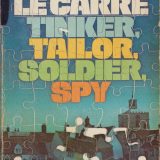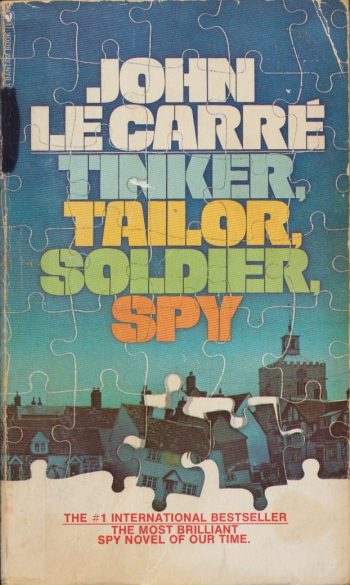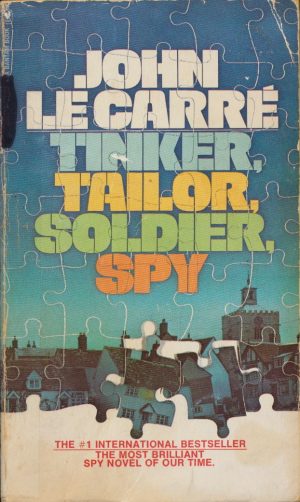Tinker, Tailor, Soldier, Spy – John le Carré – 1974
Reviewed by: Andrew Scal Date: 3 March 2003
Be forewarned that I am writing this review because I like this book so much I hope to encourage others to read it. To that end, please accept that I will describe it in such a manner that those of you who might decide to read it will be able to enjoy the story without my robbing you of the pleasure of anticipation and surprise.
A story is not necessarily literature; but in my opinion, literature, especially great literature must be a story.
Story:
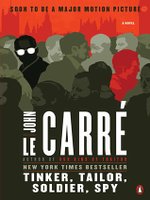 As a story – a spy novel, Tinker, Tailor, Soldier, Spy is anything but chronologically linear. There are so many sub-plots within sub-plots that it is entirely fitting that when the Beeb (BBC) made a film version, the opening credits scroll over traditional Russian Matryoshka dolls. Open one doll, and there’s another one inside, and so on until you come to the final, smallest one. The final doll in the opening has no face painted on it, a rather good indication of what is to come.
As a story – a spy novel, Tinker, Tailor, Soldier, Spy is anything but chronologically linear. There are so many sub-plots within sub-plots that it is entirely fitting that when the Beeb (BBC) made a film version, the opening credits scroll over traditional Russian Matryoshka dolls. Open one doll, and there’s another one inside, and so on until you come to the final, smallest one. The final doll in the opening has no face painted on it, a rather good indication of what is to come.
It’s a terrific story. But not for Robert Ludlum fans. It moves slowly most of the time. Much of the writing is either LeCarre explaining someone’s thoughts, or conversations. Very little ‘action.’ James Bond this ain’t. The Russian dolls are fitting in another way. The plot centers on the cold war struggle between ‘The Circus’ as the British counterintelligence service is nicknamed, and ‘The Centre’ – the Moscow office of the Soviet intelligence services.
Imagine a boxing match that takes place in the dark. And give each fighter a flashlight that he may use to find the other fellow. But he knows full well that using the flashlight has its dangers. If he illuminates the other, well, the other knows where he is, just the same. If he turns it on and sees nothing, then he has given away his position with little in return. Or has he? For in the great game of cold war espionage, knowledge was gold, and sometimes knowing where the other fellow wasn’t, could be vital. Or it could be a way to give the other fellow a shining nugget of fool’s gold: let him think you don’t know where he is. Spies apparently play the “I know that he knows that I know that he knows that I know that he knows….” as much as children do. In this case though, the results can mean life or death; a knighthood or forced retirement.
As with many of LeCarre’s other works, this one begins and hinges on an apparently insignificant detail retrieved by a flawed agent from a questionable source. Our hero George Smiley is brought out of retirement to conduct an independent investigation, for if the nugget is indeed gold rather than fools gold, The Circus has been pointing its own flashlight at itself for years now. “Quis Custodis Ipsis Custodiensis, indeed. (Who spies on the spies?) Smiley takes the information, uses ‘tradecraft’ – jargon for espionage skills, that he has acquired over a lifetime, to try to find out the secret that his revered former chief died in disgrace trying to crack: has The Centre penetrated The Circus at the highest levels so as to be in fact running The Circus by proxy? The implications are staggering.
Literature:
Often it seems that at least in part, the definition of ‘Great Literature” is that it was written a long time ago by someone who died penniless and whose talent was only recognized years later. I’m sure that definition bothers neither Stephen King nor Jeffrey Archer much. Tinker, Tailor, Soldier, Spy was written in 1974 by a fellow who is still alive and has made a rather good living from writing.
Literature arises out of some particular talent an author has for articulation. That is, she or he can use words so that the majority of readers will form a mind’s eye image more or less consistent with that which was intended. Of course, s/he must be describing something that readers find interesting or significant. That is, it must contain a good story. This particular story requires a fair amount of active ‘listening’ on the part of the reader. As with any other mystery, real or fictional, there are hints and clues scattered randomly throughout, much like the random placement of law students sleeping through an 8:30 am Corporations Law class.
I particularly enjoy Le Carre’s persistent typically British understatement. It gives the book a slow steady pace. When characters interact, he doesn’t just use it to provide the reader with information. The interaction itself is part of building the mood and making the characters more three-dimensional. In addition to understatement, he uses the English trait of nicknaming things, in a very consistent way to avoid what otherwise might seem melodramatic.
LeCarre’s ability to turn prose into poetry sometimes takes my breath away. From page 105 of the 2002 Pocket Books edition:
‘He had that art, from miles and miles of secret life, of listening at the front of his mind; of letting the primary incidents unroll directly before him while another quite separate faculty wrestled with their historical connection. The connection ran through Tarr to Irina, through Irina to her poor lover who was so proud of being called Lapin, and of serving one Colonel Gregor Viktorov “whose workname at the Embassy is Polyakov.” In his memory, these things were like a part of a childhood: he would never forget them.’
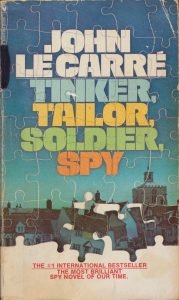 With the book, the BBC film version I mentioned earlier is one of the few book-film combinations where it is hard to choose which is the better of the two. The musical score for the film does an incredible job of carrying the mood from one scene to another. Where another film might have to spend time and action setting the mood up, here the music helps it pass almost seamlessly from one issue to another, like a well-written Bar Exam Essay. I would venture to say that you would get just as much enjoyment out of both film and book no matter which you took up first. Although much time and haze separate me from the truth of the matter, I believe I saw the film first.
With the book, the BBC film version I mentioned earlier is one of the few book-film combinations where it is hard to choose which is the better of the two. The musical score for the film does an incredible job of carrying the mood from one scene to another. Where another film might have to spend time and action setting the mood up, here the music helps it pass almost seamlessly from one issue to another, like a well-written Bar Exam Essay. I would venture to say that you would get just as much enjoyment out of both film and book no matter which you took up first. Although much time and haze separate me from the truth of the matter, I believe I saw the film first.
On a personal note, the story takes place in England in the mid-Seventies, a time during which I lived in London a short while. The descriptions in the book, and the background in the film are take me back to a time and place that has changed a great deal since.
I would be very interested to hear other readers’ comments.


